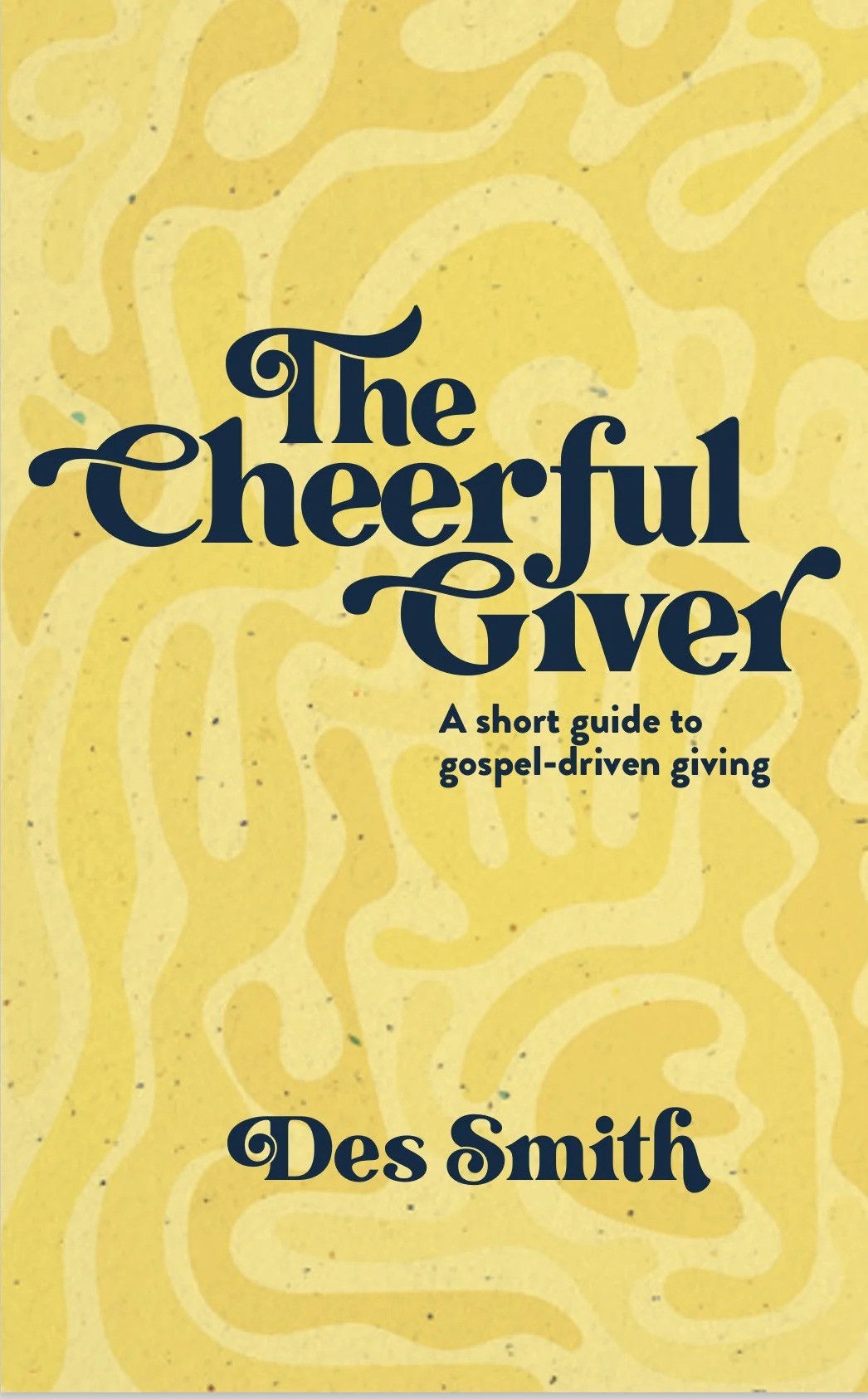Financial giving often gets relegated to an awkward upfront announcement or a footnote at the bottom of an email bulletin. Perhaps the church receives an annual update with accompanying charts and figures. If that’s all the space our churches give, no wonder we’re not generally cheerful givers.
Gospel generosity ought to energise and excite us, filling us with joy at what God is doing and how we get to be a part of it. It should be transformative and powerful, spurring on kingdom projects so that we see God glorified as people are brought from death to life. Ultimately, our gospel-hearted generosity should reflect the unbound generosity we ourselves have received from God in Christ.
This is at the heart of Des Smith’s short book, The Cheerful Giver. As he puts it, we are transformed to reflect and be motivated by the “flahoolick” generosity of God.

The Cheerful Giver: A short guide to gospel-driven giving
Des Smith
The Cheerful Giver: A short guide to gospel-driven giving
Des Smith
How would you feel if somebody described you as a generous person?
Most of us would feel pretty good about it. We warm to people who are generous, so we very much like being thought of as generous ourselves. Yet most of us also know how difficult it is to actually be generous.
In this short book, Des Smith shows how the Bible—and the life-changing gospel of Jesus Christ that it declares—teaches us to live generous lives.
“Flahoolick” is an Irish phrase Smith grew up with and it means “over-the-top, almost irresponsibly generous”. He describes it as the guy who shouts the whole bar a drink (something I’m sure only exists in movies). But God is flahoolick even more so:
We live in an almost-embarrassingly abundant world, because God loves us … The fact that some of us don’t have as much as others—or enough at all—isn’t because God hasn’t given us enough. It’s often because we haven’t shared it well enough. The problem is not with God’s generosity; he has given us everything we have materially, and he’s given it to us for our joy. (12–13)
And that’s the beauty of this little book, because it doesn’t start with us. It starts with God. In his brief journey through biblical principles and passages, Smith shows us how to imitate God as cheerful givers.
Reframing Our Focus
When generosity starts with us, we ask questions like, “Why should I give? How much should I give? What impact can I have?”. It’s focused on us, and we compare ourselves to what we think others are like (but we have no idea, because it’s too uncomfortable to talk about it). Although Smith uses these questions to structure his book, he also reframes them to be God-centred instead.
We can ask, “What has God given me and who has he made me?”. God is more interested in our hearts than our money. He wants transformed hearts that give joyfully in response to him, rather than hearts filled with greed or reluctance.
“What of God’s gifts to me can I give away and share with others?”. Here we can look practically and realistically at our budgets. When greed prowls nearby and we’re tempted to be cautious, prayerfully push towards generosity.
“Are my priorities God’s priorities for generosity, and what work has he enlarged my heart for?”. Alongside setting out biblical principles for prioritising giving to various needs, Smith also encourages us to have fun here. He considers how God has given us each different passions and interests which fill our heart with joy in giving.
And then he encourages us to just do it. Don’t put it off. There’s no point thinking if you never do it. Smith concludes:
If you can’t give much, think about other ways you can give. You can be generous with your time, your skills, or your possessions … And of course, if you are in need yourself … The church is here to support each other … The good news in all of this is that, whether we can give a lot or a little, giving is good for us: “It is more blessed to give than to receive” (Acts 20:35). (64)
For the Everyday Christian
The Cheerful Giver takes about an hour to read, so it doesn’t map all of the theological questions around generosity. It only lightly explores the connections between giving under Old Testament law and generosity as part of New Testament living. A deeper dive could have demonstrated how God’s provision for his people for their benefit and the benefit of others is not new, but a developing theme throughout the biblical narrative. Further, Smith doesn’t explore the eschatological implications for gospel generosity, which arguably add greater joy and motivation to the act of giving. However, Smith is not attempting to write a theological treatise, but majors on accessibility and practicality with plenty of personal anecdotes and concrete steps.
Smith is aware that that when Jesus talks about alternative gods we worship, money is an immense competitor (Matt 6:24). If we’re honest, we’re familiar with that tussle too. The Cheerful Giver equips everyday Christians with greater biblical manpower in their wrestle against greed and for gospel generosity.










